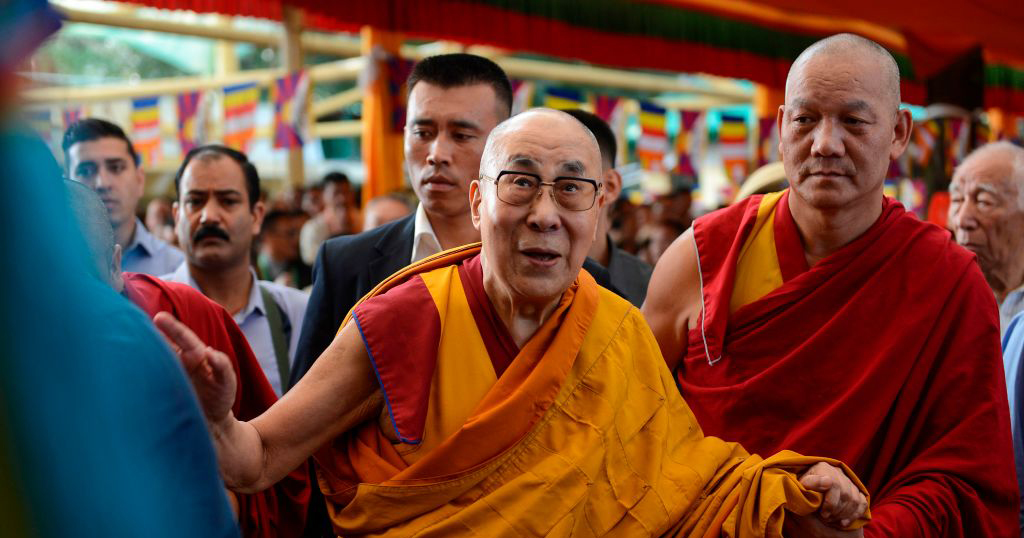The centuries-old tradition of recognising a reincarnate lama (spiritual leader) might soon come to an end.
The 14th Dalai Lama (also known as Tenzin Gyatso) suggested, in an October 25th meeting with students from North Indian universities, that this custom "may have had its day".
The Dalai Lama's Office said, in a statement:
"He remarked that no such custom existed in India. There is no reincarnation of the Buddha or Nagarjuna. He wondered what place this institution has in a democratic society."
Traditionally, senior Tibetan Buddhist monks are believed to be reincarnated into the body of a child after they die.
Tibetan spiritual leaders are also believed to be able to determine if they are going to be reborn, and where they'll be reborn.
The Tribune India reported the Dalai Lama as saying that this custom of recognising tulkus (reincarnate lama) developed in Tibet because of some connection with the feudal system.
"Many Tibetan institutions are related with feudalism," he added. "I feel it’s time that we revert to the Indian system of Buddhism in which there was no Lama system."
This tradition of recognising reincarnate lamas has been practised since the 15th century, and it is currently the most common way of sustaining spiritual lineages in Tibetan Buddhism.
However, the Dalai Lama suggested that it should change with the times. The Times of India quoted the him as saying:
"In 1969, in one of my official statements, I had mentioned that it should continue… But now I feel, not necessarily. It should go… The system should end, or at least change with the changing times. There have been cases of individual lamas who use reincarnation… but never pay attention to study and wisdom.
Chinese government insists on having a say in the next Dalai Lama
The Dalai Lama's words come in the wake of China's insistence that its leaders have the right to choose his successor, reported Reuters in March this year.
The Chinese Foreign Ministry then said that "reincarnations, including that of the Dalai Lama, should observe the country’s laws and regulations and follow the rituals and history of religion".
It is believed that the Chinese government wants a say in the next Dalai Lama to exert control over Tibet.
The current Dalai Lama has been branded a separatist by the Chinese government and he now resides in exile in India.
Previously brought up possibility of discontinuing reincarnation practice
This wasn't the first time the Dalai Lama mentioned discontinuing the practice of reincarnation.
In 2011, he laid out the concepts and guidelines for the reincarnation of the lamas "so that there is no room for doubt or deception". Back then, he wrote:
"When I am about ninety I will consult the high Lamas of the Tibetan Buddhist traditions, the Tibetan public, and other concerned people who follow Tibetan Buddhism, and re-evaluate whether the institution of the Dalai Lama should continue or not."
Should there be a need for the institution of the Dalai Lama to be continued, the responsibility of recognising the 15th Dalai Lama will rest only with the Dalai Lama’s Gaden Phodrang Trust, he said.
In 2014, the Dalai Lama told the BBC that it's "much better that a centuries-old tradition should cease at the time of a quite popular Dalai Lama".
US affirms Tibet's right to chose their own spiritual leaders
More recently on Oct. 28, U.S. Ambassador at Large for International Religious Freedom Sam Brownback reaffirmed the US's position that only the Tibetan people have the right the choose their own religious leaders.
In fact, the US Congress also recently introduced a new bill -- the Tibetan Policy and Support Act of 2019 -- which threatens to sanction Chinese officials who interfere with the selection of a new Dalai Lama.
These sanctions include freezing of assets and denial of entry into the United States, reported Radio Free Asia.
Without a reincarnation of the Dalai Lama, it is most likely that China will push for its own candidate to take over once the 14th Dalai Lama passes on.
Top image by LOBSANG WANGYAL/AFP/Getty Images.
If you like what you read, follow us on Facebook, Instagram, Twitter and Telegram to get the latest updates.
